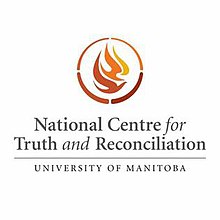National Centre for Truth and Reconciliation
The National Centre for Truth and Reconciliation is the archival repository for all of the material collected by the Truth and Reconciliation Commission of Canada.
 | |
| Country | Canada |
|---|---|
| Type | Academic, Community |
| Location | Chancellor’s Hall, 177 Dysart Road, University of Manitoba, Winnipeg |
| Other information | |
| Budget | $2.8 million |
| Director | Ry Moran |
| Staff | 22 |
| Website | nctr |
History
The National Centre for Truth and Reconciliation (NCTR) was created as part of the 2007 Indian Residential Schools Settlement Agreement, which dictated that a permanent archive would be established to contain the records of the Truth and Reconciliation Commission (TRC).[1] The Centre contains all of the residential school survivor testimony, archival documents, and other materials collected by the TRC from 2009 to 2015.[2] The holdings include millions of church and government records, hundreds of residential school photographs, and over 7,000 survivor statement collected by the TRC.[3] The NCTR opened in the fall of 2015 in Winnipeg, on the campus of the University of Manitoba.[4] The digital archive portion of the NCTR opened to the public on November 3, 2015.[5] In December 2016 the Canadian Federal Government allocated $10 million to the ongoing operations of the NCTR.[6] In September 2019, the NCTR was added to the UNESCO Canada Memory of the World Register.[7]
The NCTR is intended to be a repository for the complete history and legacy of the residential school system, with the goal of teaching Canadians about this history.[8]
Governance
The NCTR is governed by an administrative agreement between the TRC and the University of Manitoba.[9] The Centre is overseen by a seven-member governing circle, composed of three Survivors, two representatives from the University of Manitoba, and two members from partner organizations.[8] The NCTR is also overseen by a Survivor Circle, which is include First Nations, Métis, and Inuit Survivors of the residential school system from across Canada.
Collections
In 2018 it came to light the NCTR was still waiting on over 3,000 photographs and numerous boxes of litigation material to be submitted from the Grey Nuns of Montreal.[10] Under the Indian Residential Schools Settlement Agreement religious and government bodies involved in the operations of the residential schools were legally required to submit all relevant residential school records to the TRC, which would then by transferred to the NCTR.[11]
Programming
The NCTR is engaged in a range of educational and research programming related to residential schools, healing, and reconciliation. Ongoing programming includes:
- "Imagine a Canada," a national art and essay program engaging Canadian youth in thinking about what reconciliation can look like.[12]
- "Lessons from the Indian Residential School Settlement Agreement." This initiative seeks input and feedback from Survivors on their experiences with the settlement agreement, and to foster discussion about what worked and didn't work with the agreement process.[13]
On September 30, 2019 to coincide with Orange Shirt Day the NCTR released in ceremony a memorial register which documents the 4,037 students who died while attending residential schools across Canada.[14] The creation of this register was in response to the Truth and Reconciliation Commission of Canada's final report and calls to action, which included a directive to create a register to document and honour those who passed away at residential school.[15][16] At the time of release, the NCTR noted that the register was not complete and that many names of students who died are still unknown.[15]
References
- "National Centre for Truth and Reconciliation » Organizations | HR Hub". HR Hub. Retrieved October 24, 2018.
- "Truth and Reconciliation Commission of Canada (TRC)". trc.ca. Retrieved October 24, 2018.
- "National Centre for Truth and Reconciliation opens in Winnipeg | CBC News". Canadian Broadcasting Corporation. Retrieved October 24, 2018.
- "National Centre for Truth and Reconciliation to open at U of M | CBC News". Canadian Broadcasting Corporation. Retrieved October 24, 2018.
- "Terabytes of testimony: Digital database of residential school stories opens to the public | CBC Radio". Canadian Broadcasting Corporation. Retrieved October 24, 2018.
- "Truth and reconciliation centre in Winnipeg to get $10M from feds | CBC News". Canadian Broadcasting Corporation. Retrieved October 24, 2018.
- Monkman, Lenard (September 11, 2019). "National Centre for Truth and Reconciliation archives added to UNESCO world register". Canadian Broadcasting Corporation. Retrieved October 23, 2019.
- "Ry Moran, Director of the National Centre for Truth and Reconciliation - OPEN SHELF". OPEN SHELF. April 1, 2015. Retrieved October 24, 2018.
- "Centre for Truth and reconciliation Administrative Agreement" (PDF). June 21, 2013. Retrieved October 24, 2018.
- "Some Catholic orders still withholding promised residential school records | CBC News". Canadian Broadcasting Corporation. Retrieved October 24, 2018.
- "Library and Archives Canada finally releases 98-year-old document on sick First Nations children | CBC News". Canadian Broadcasting Corporation. Retrieved October 24, 2018.
- "National Centre for Truth and Reconciliation honours 10 Saskatchewan youth". Regina Leader-Post. May 12, 2017. Retrieved October 24, 2018.
- "Lessons from IRSSA – NCTR Educational Resources". education.nctr.ca. Retrieved October 24, 2018.
- Manitoba - //www.umanitoba.ca, University of. "4,037 Indigenous children listed in Memorial Register". Retrieved October 23, 2019.
- "Names of 2,800 children who died in residential schools documented in registry". Retrieved October 23, 2019.
- Pashagumskum, Jamie (October 1, 2019). "Children who never returned from residential school commemorated in Quebec". Canadian Broadcasting Corporation. Retrieved October 23, 2019.